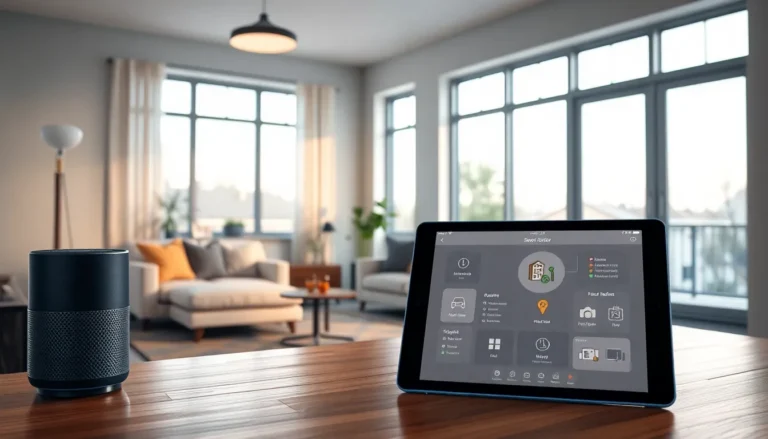Imagine walking into your home and having the lights dim to your favorite setting while your coffee brews itself. Sounds like a scene from a sci-fi movie, right? But with the rise of home automation franchises, this dream is quickly becoming a reality. Home automation isn’t just a tech trend; it’s a lifestyle upgrade that makes everyday living more convenient, efficient, and, let’s be honest, a little cooler.
As people embrace smart technology, the demand for home automation services is skyrocketing. This presents a golden opportunity for savvy entrepreneurs looking to dive into a booming market. With a home automation franchise, one can tap into a world where homes are not only smarter but also more secure and energy-efficient. So, why not join the revolution and turn your entrepreneurial dreams into a reality? After all, who wouldn’t want to be the go-to guru for transforming homes into futuristic havens?
Table of Contents
ToggleOverview of Home Automation Franchise
Home automation franchises offer an opportunity for entrepreneurs to tap into the expanding market of intelligent living solutions. Businesses in this sector provide services to enhance convenience, efficiency, and security in residences.
Definition of Home Automation
Home automation refers to the integration of technology in household systems such as lighting, security, and climate control. This integration allows homeowners to control these systems remotely via smartphones or other devices. Automation simplifies daily tasks and boosts energy efficiency through smart technologies. Examples of automated systems include smart thermostats, security cameras, and lighting controls. These innovations create a seamless living experience, allowing users to tailor their environment according to preferences.
Growth of the Industry
The home automation industry has witnessed substantial growth, projected to reach $174 billion by 2025. Several factors contribute to this surge, including increased consumer awareness and technological advancements. Rising demand for energy-efficient solutions drives homeowners to invest in automated systems. Market research indicates that the global market for smart home devices grows rapidly, with a compound annual growth rate of 25 percent. This growth presents a unique opportunity for franchise owners to enter a market poised for expansion.
Benefits of Investing in a Home Automation Franchise

Investing in a home automation franchise presents numerous advantages for entrepreneurs seeking to enter a thriving market. The franchise model offers support and structure, facilitating growth in this innovative field.
Financial Potential
Earnings in the home automation sector can be significant, driven by steady demand for smart home products and services. Revenues are projected to increase, with the market expected to reach $174 billion by 2025. Profit margins in this industry often range from 15% to 30%, depending on the franchise and service offerings. Franchisees can benefit from established pricing models and strong brand recognition, minimizing risks associated with starting a new business. Additionally, with diverse revenue streams, including installation services and ongoing maintenance contracts, investors can maximize their financial returns.
Technological Advancements
Technology in home automation evolves rapidly, providing franchisees with cutting-edge tools and solutions. Innovations like artificial intelligence and Internet of Things devices enable seamless integration, enhancing user experiences. Staying current with these trends gives franchise owners a competitive edge. Franchisors often provide training on the latest technologies, ensuring franchisees remain knowledgeable and skilled in deploying new systems. This knowledge can drive customer satisfaction and loyalty, leading to repeat business and referrals.
Customer Demand
Consumer interest in smart home solutions continues to grow, fueled by increased awareness of energy efficiency and home security. Surveys show that over 70% of homeowners are considering automation upgrades to improve lifestyle and convenience. As homeowners seek modern amenities, franchisees can capitalize on this demand by offering tailored solutions. An expanding customer base creates opportunities for impactful marketing and brand visibility. Strong customer support strengthens relationships, ensuring ongoing demand for services and products within the franchise.
Key Players in the Home Automation Franchise Market
The home automation franchise market consists of established brands and new entrants that shape the industry landscape.
Leading Franchise Brands
Prominent franchise brands dominate the home automation sector. They include Control4, which focuses on smart home control solutions, and ADT, known for home security systems. Vivint also plays a vital role, providing comprehensive home automation and monitoring services. Each of these brands capitalizes on strong market presence and brand recognition, leading to increased consumer trust. The financial backing and resources from these established players facilitate franchise growth and innovation, enhancing the adoption of smart home technologies.
Emerging Competitors
New entrants continue to emerge in the home automation franchise market. Companies like Smart Home Pros and Home Automation Solutions are capturing attention with innovative offerings. These competitors often focus on niche markets, providing tailored solutions to specific consumer needs. Their agility enables rapid development and deployment of cutting-edge technologies in the realm of smart homes. As these emerging brands build their reputations, they contribute to heightened competition and drive further advancements in home automation services.
Challenges of Running a Home Automation Franchise
Running a home automation franchise presents unique challenges that can impact success in this growing industry.
Market Competition
Competition in the home automation sector is intensifying. Established brands like Control4 and ADT have significant market share, creating hurdles for new entrants. New competitors, including Smart Home Pros and Home Automation Solutions, target niche markets with innovative offerings, heightening rivalry. Franchisees may face pressure to differentiate their services and maintain customer loyalty. Standing out requires leveraging unique selling propositions and delivering exceptional customer service. Adapting to changing consumer preferences also plays a crucial role in sustaining competitive advantage.
Technological Obstacles
Technological advancements often come with challenges for home automation franchises. Rapidly evolving technologies require franchisees to stay informed and invest in continuous training. Integrating new devices and systems into their offerings can pose significant hurdles. Compatibility issues between various products might complicate installations and customer satisfaction. Franchisees must navigate these challenges while delivering reliable and user-friendly solutions. Moreover, staying current with tech trends ensures they meet consumer expectations and capitalize on emerging opportunities. Embracing innovation is essential for long-term success in the evolving home automation market.
The home automation franchise market offers a promising avenue for entrepreneurs eager to capitalize on the growing demand for smart living solutions. With technological advancements driving consumer interest in energy efficiency and security, franchisees have the opportunity to position themselves at the forefront of this innovative industry.
By leveraging established brands and proven business models, they can navigate the competitive landscape more effectively. Embracing continuous learning and adapting to emerging trends will be essential for long-term success. As the market continues to expand, those who invest in home automation franchises are likely to reap significant rewards while enhancing the quality of life for homeowners.









